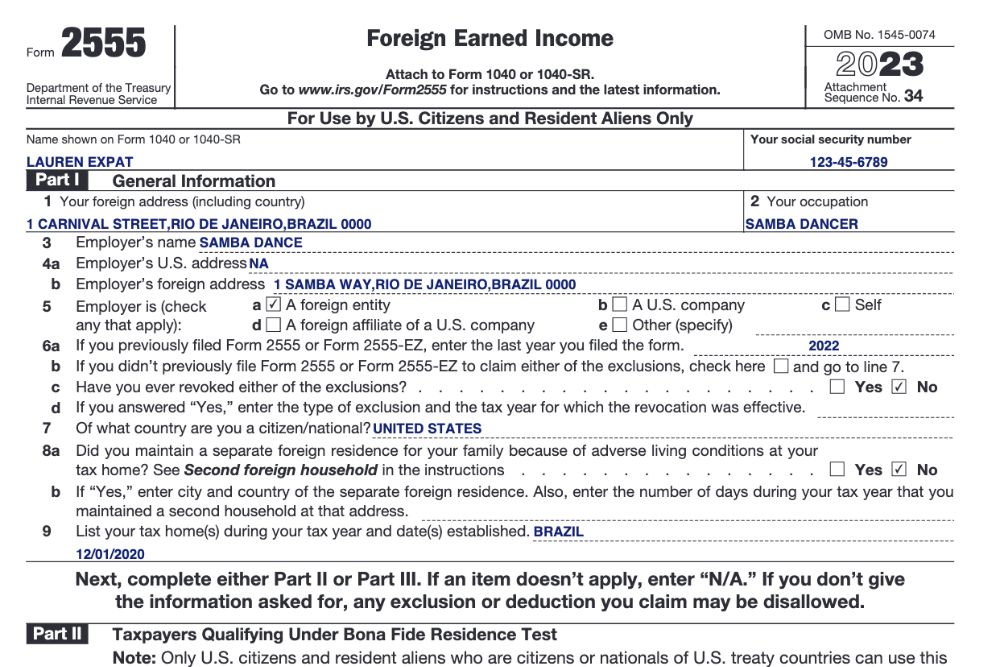What Is Unearned Income? A Guide for Expats

Americans living abroad are required to report their worldwide income to the IRS every year. Not all forms of income are taxed equally, however, and the most important distinction is earned vs. unearned income. But what is unearned income—and how does it fit into your expat taxes? Let’s take a look.
What Is Earned Income?
Typically, earned income means receiving compensation for a service you’ve provided.The IRS says you must report all of your ‘earned income’ on your tax return, no matter where it comes from. Common types of earned income include:
- Wages
- Salaries
- Bonuses
- Tips
- Commissions
- Vacation pay
- Sick leave
- Severance pay
- Union strike benefits
- Disability benefits
- Self-employment income
Use our simple excel calculator to get an estimate of how the foreign earned income exclusion will save you money. It will make your day!

What Is Unearned Income?
While earned income generally means compensation for service, unearned income means generating profits that the IRS considers you not really actively doing anything. Common types of include:
- Interest
- Dividends
- Pension payments
- Rental income
- Capital gains
- Annuity payments
- Royalties
- Alimony
- Awards
- Unemployment benefits
- Taxable Social Security benefits
- Gambling winnings
- Debt relief
- Distributions from trusts or retirement accounts
Unearned income is sometimes called passive income. These two terms are used interchangeably for tax purposes.
If you’re still unclear on the difference, here are some examples.
Earned Income vs. Unearned Income Examples
Example 1
Jacquelyn earns $70,000 per year as a freelance web developer. She also rents her apartment for $1,500 per month ($18,000 per year) and operates an online share portfolio that brings in $500 per year.
Jacquelyn’s self-employment income is earned, while her rent and portfolio profits are unearned. That means she would report:
- $70,000 in earned income
- $18,500 in unearned income
Example 2
Zach works as a bartender, making $8,750 a year in wages. Most of his annual income comes from tips, which add up to $26,250. Zach also plays professional poker on the side, which the IRS considers to be a hobby activity, making about $12,000 for the year.
Zach’s wages and tips are earned income, while his poker winnings are unearned income. This comes out to:
- $35,000 in earned income
- $12,000 in unearned income
Example 3
Alejandro is between jobs for the year. He does have some sources of income, though. Because of the money in his savings account, he gets $105 in interest. He also receives $2,500 in unemployment benefits and $10,000 in capital gains due to selling his house.
All of Alejandro’s income is unearned income, totaling $12,605 for the year.
Example 4
Amelia is a semi-retired teacher who receives a $25,000 pension. Now, she works as a tax preparer, bringing in another $30,000 per year. On top of this, she’s also a savvy investor, making about $6,000 in dividends.
Amelia’s income as a tax preparer is earned, while her pension and dividends are unearned. This means she makes:
- $30,000 in earned income
- $31,000 in unearned income
Is Foreign Unearned Income Taxable?
Yes. When expats file their US Federal Tax Returns each year, they must report all of their worldwide income, including both earned and unearned income. Like earned income, you’ll include your unearned income in your Adjusted Gross Income (AGI) on your tax return.

How Is Unearned Income Taxed?
Unearned income is generally taxed the same as earned income, but there are some key differences worth noting.
To start with, unearned income is not subject to Social Security or Medicare payroll taxes as earned income is. (Though earned income may also be exempt from these taxes if the US has entered into a Totalization Agreement with the country you reside in.)
Beyond this, when it comes to long-term capital gains and dividends, the unearned income tax rate can drop significantly depending on your tax bracket and filing status. In some cases, this could mean major savings.
0% Rate:
Single Filers: Income up to $44,625
Married Filing Jointly: Income up to $89,250
Head of Household: Income up to $59,750
15% Rate:
Single Filers: Income from $44,626 to $492,300
Married Filing Jointly: Income from $89,251 to $553,850
Head of Household: Income from $59,751 to $523,750
20% Rate:
Single Filers: Income above $492,300.
Married Filing Jointly: Income above $553,850.
Head of Household: Income above $523,750.
These rates are specifically for long-term capital gains, which are gains on assets held for over a year. For short-term capital gains (assets held for one year or less), the tax rates are equivalent to the ordinary income tax rates, ranging from 10% to 37%.
Unfortunately, you can’t use the unearned income to contribute to your IRA. That means that if you live exclusively on this income—such as unemployment benefits or a trust fund—you’ll have to find an alternate method to stow away funds for your retirement.
How Can I Reduce My Expat Tax Liability for Unearned Income?
There are several ways for expatriates to reduce their US tax liability on unearned income. One of the most common ways is by claiming the Foreign Tax Credit, which helps Americans living abroad avoid double taxation.
For example, if you live in Portugal and pay a tax to the Portuguese government for the income you’ve earned within their borders, you’ll have to report that same income to the IRS—since US tax law requires all citizens to report their worldwide income.
This could lead to double taxation, meaning you pay taxes twice on the same income, once to Portugal and once to the US.
To help expats avoid double taxation, the IRS lets expats take a foreign tax credit for taxes paid to or accrued to a foreign government. This is a dollar-for-dollar tax credit you can use to reduce the taxes you owe to the IRS. This is especially helpful in higher-tax countries.
If you live in a country that has entered into a tax treaty with the US, you may be able to lower the tax obligations that would typically be associated with your unearned income.
Best of all, you can claim the Foreign Tax Credit for both earned and unearned income. So if you’re already paying taxes to your country of residence for your interest, capital gains, pension, or other unearned income, you won’t have to worry about paying Uncle Sam too. (Though you’ll still need to report your entire income.)
Using the Foreign Tax Credit can reduce your US tax to $0. But what if your tax rate paid to a foreign government is more than your US tax rate? You won’t be able to get a refund from the IRS for the difference between the two rates. Instead, you carry any excess credit over for future years, decreasing your chances of owing the IRS.
Another potential method for easing the tax burden is through a tax treaty. The US has established treaties with numerous foreign nations to help offer tax benefits for Americans living abroad.
If you have unearned or passive income, then the Foreign Tax Credit is your best option to help reduce or eliminate double taxation. Unfortunately, the Foreign Earned Income Exclusion (FEIE) is only helpful for earned income.
Have Questions about Unearned Income? Get Expert Assistance With Your Expat Taxes
In this post, we’ve gone over the basics of how unearned income will factor into your expat taxes. But US tax law is always complex, especially for Americans living abroad. Knowing precisely what you need to report or what you owe can be difficult. Let us help!
Contact us, and one of our customer champions will gladly help. If you need very specific advice on your specific tax situation, you can also click below to get a consultation with one of our expat tax experts.



